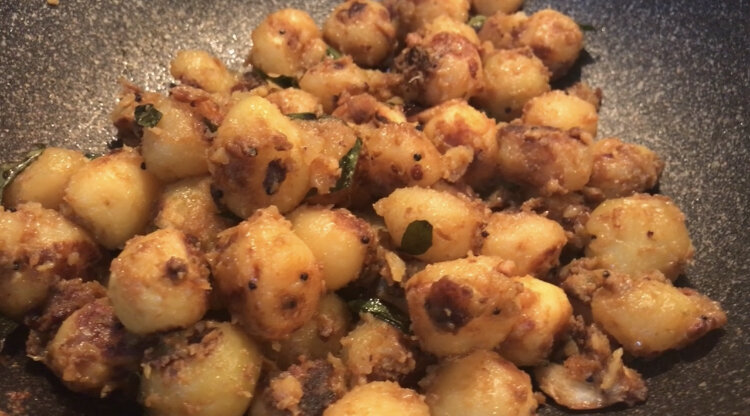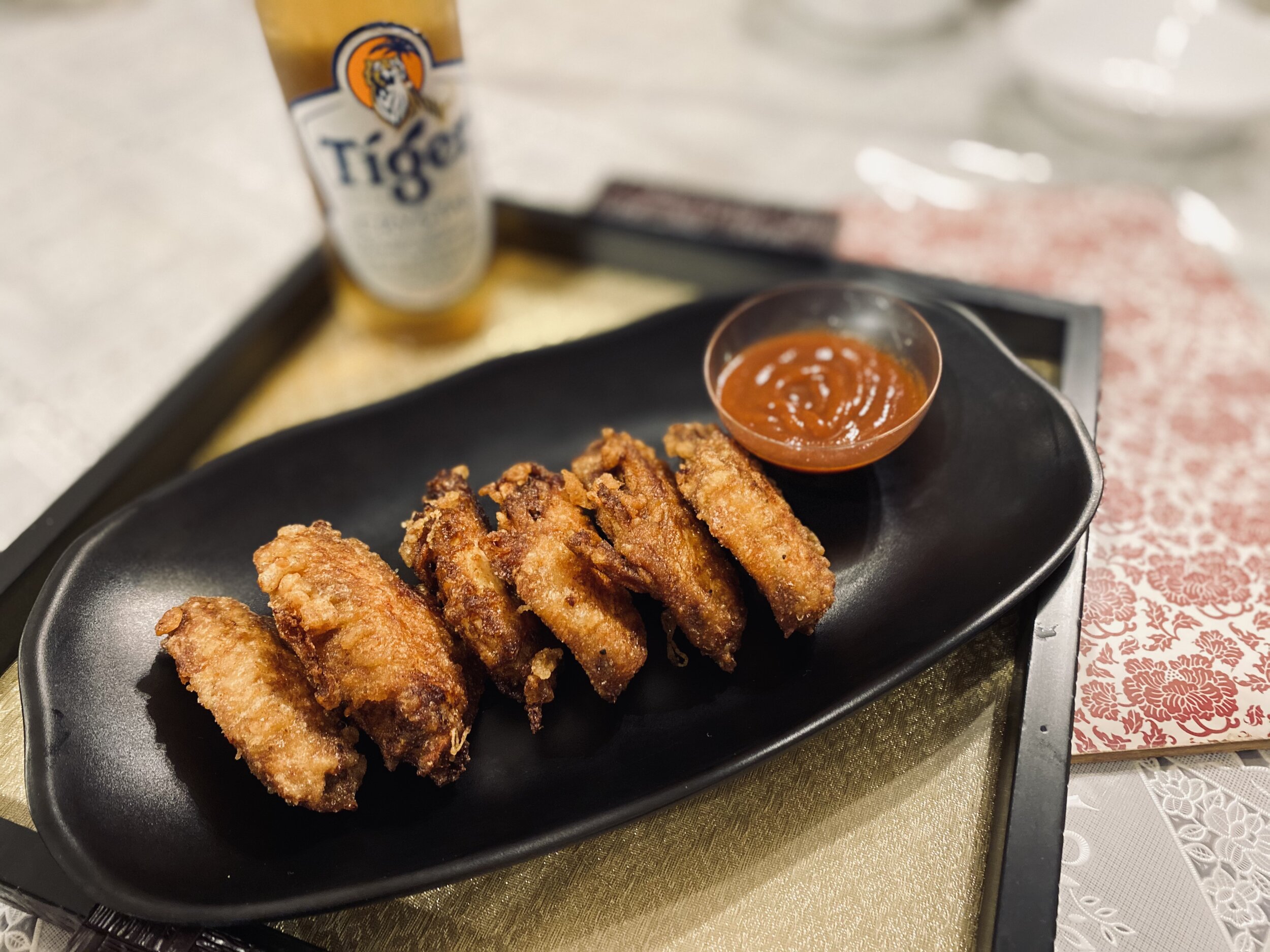Memories of school lunches with Urulai Roast
Urulai Roast has long been a lunch box favourite, whether it was in our carb heavy school lunch boxes or as an accompaniment to the refreshing thayir saadam (yoghurt rice) on long and tedious drives to Chettinad. While these deliciously spicy potatoes, slow roasted to perfection, can be made with regular potatoes, the better half loves it with baby potatoes. For him, any trip to the Indian grocery store is incomplete without a quest for the elusive bag of those teeny-weeny baby potatoes, or as some call them - new potatoes.
Talking of school lunch boxes, in the days before the high protein fad kicked in, Ayah’s standard school lunch and one most South Indian parents would vouch for, was a variety rice paired with a vegetable of some sort. While I grumbled no end about the rather unimaginative lunches (in my mind) in those days, today, those are the same dishes I crave – the comfort food I take solace in. The variety rice ranged from the tangy puli saadam (tamarind rice) and elumbichai saadam (lemon rice) to malli saadam (coriander rice) to the then much hated thayir saadam / yoghurt rice). Given Aiyah’s partiality to potatoes, on most days, the vegetable of choice was a toss-up between the urulai roast and urulaikizhangu ennai vazhakkai (recipe to be posted soon). And then there was the podi vendakkai (roasted okra tossed in the apprentice’s favourite podi) and the ubiquitous kootu (seasonal vegetables simmered with lentils). Being a hard-core non-vegetarian, at least in my school days, I craved for the occasional fish or chicken or mutton to make it to my lunch box, but Ayah was wiser than the gluttonous me! One day I snuck in some senna kunni podi (dried shrimp powder) with idlis in my tiffin box and horror of horrors, none of my friends would sit with me at lunch time – and I couldn’t for the life of me understand why... needless to say, that was the end of my experimenting with non-vegetarian food at school.
As I graduated from school and college, Ayah, who baulked at the long hours wannabe hoteliers worked, decided she had to pamper me and so would pack a large tiffin box with kootu saadam (kootu mixed with rice) or sambhar saadam (rice simmered in sambhar), both loaded with oodles of ghee - absolute comfort food, but probably not the best idea for a foodie with a genetic tendency towards obesity! Ah, the spoils of love… And then there is the young apprentice’s love affair with food in general, but garlic bread in particular, born out of that same affection. I have to say both of us have had to spend many an hour at the gym working off that unconditional love.
Loving lunch boxes aside, Urulai Roast is a rather simple dish lending itself as a perfect accompaniment to any South Indian lunch menu. A note about the sambhar powder used in the recipe. Every modern South Indian home depends on their parents for their stock of sambhar powder or alternatively uses store bought brands which are usually missing something. Ayah’s stock of sambhar powder, sparingly used, has lasted us nearly 8 years after her passing - despite the grumbling spouse who cringes every time he sees my overstocked “Indian” fridge filled to the brim with Indian spices, flours and vathals stored for years on end.
Despite its simplicity, one thing to note, especially when using baby potatoes is the care needed to roast them perfectly. I’ll forever remember a favourite Aunt’s advice – take a wide enough thick bottomed pan so it roasts evenly and don’t make it in large quantities. Alternatively, if you are in a hurry, toss the baby potatoes out and switch to regular potatoes – they cook much quicker as the apprentice found. Whichever one you choose, hope the Urulai Roast makes its way your lunch boxes and becomes your comfort food too.
Notes:
1. While the original recipe uses baby potatoes (new potatoes), it is quite tasty when made with regular potatoes as well. So, choose either - if you're in a hurry, definitely go for regular potatoes
2. Every South Indian home has a ready stock of Sambhar powder, regardless of whether it is homemade or branded. Either one is fine. If you can't lay your hands on any sambhar powder, substitute with red chilli powder, coriander powder and cumin powder mixed in equal quantities - the flavour will be slightly different though.
3. The choice of pan used for roasting the potatoes is very important - use a heavy bottomed pan which is wide enough to spread the potatoes in a single layer. Unfortunately, this recipe doesn't translate too well to bulk in a home environment, particularly because most homes don't have a large enough wok / frying pan to hold the quantity in a single layer.
Ingredients:
350 gm baby potatoes (about 30 baby potatoes) / 3 medium sized potatoes, boiled and peeled
Optional: 2 cloves garlic, smashed, skin on
Marination:
2 tablespoons sambhar powder
1/4 teaspoon turmeric powder
1-2 tablespoons of water
Salt to taste (~1.5 tsp)
Tempering:
2-3 tablespoons cooking oil
1 teaspoon mustard seeds
1 teaspoon urad dal
2 dried red chillis, broken in halves
10 curry leaves
1/4 teaspoon Asafoetida (hing / perungayam)
Method:
1. Boil the potatoes (if using a pressure cooker, cook for 4 whistles, if using a pot with water, put a skewer into the potatoes to check if they are cooked through – if there is no resistance they are cooked).
350 gm baby potatoes (about 30 baby potatoes) / 3 medium sized potatoes, boiled and peeled
2. Once cool, peel the potatoes.
Boil the potatoes until tender…
… and peel
3. If using big potatoes, cut them into ¾ inch cubes. If using baby potatoes, leave the smaller ones whole and the larger ones cut into halves, so they are the same size approximately. Pierce the potatoes with a fork to make tiny holes so the marination can penetrate all the way through.
4. Mix the potatoes with the sambhar powder, turmeric powder and salt and the water and marinate for about 5 minutes. If you have longer, let them sit in the masala for longer to absorb more flavours.
2 tablespoons sambhar powder
1/4 teaspoon turmeric powder
1-2 tablespoons of water
Salt to taste (~1.5 tsp)
Add the marination ingredients and…
Pierce the potatoes and marinate for about 5 minutes
5. Heat the oil in a pan (start with 2 tablespoons), add the mustard seeds and urad dal. Once the mustard seeds pop, add the dried chillies, curry leaves, garlic (if using) and asafoetida (reserve some of this for garnish).
2-3 tablespoons cooking oil
1 teaspoon mustard seeds
1 teaspoon urad dal
2 dried red chillis, broken in halves
10 curry leaves
1/4 teaspoon Asafoetida (hing / perungayam)
6. Add the potatoes and roast them over a low flame until golden brown and crispy on the outside. Stir occasionally, but gently – you don’t want them to burn, but too much stirring will cause the potatoes to break and become mushy. If you feel the potatoes are not roasting properly, add the extra tablespoon of oil and continue roasting in the pan. For the potatoes to get the right char, it should take about 10-15 minutes on low heat.
Heat the oil and add the tempering ingredients
Add the marinated potatoes and slow roast until golden brown and crispy on the outside
7. Add the garnish and serve hot with curry and rice or just yoghurt and rice.
Serves: 4 people
Apprentice Rating: Easy
Recent Posts:
















